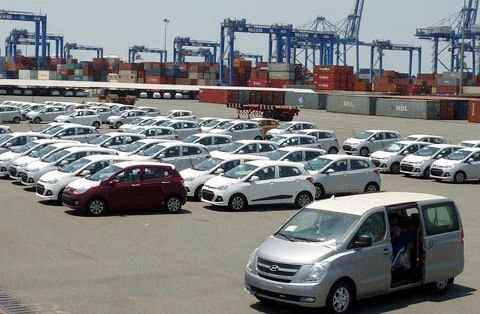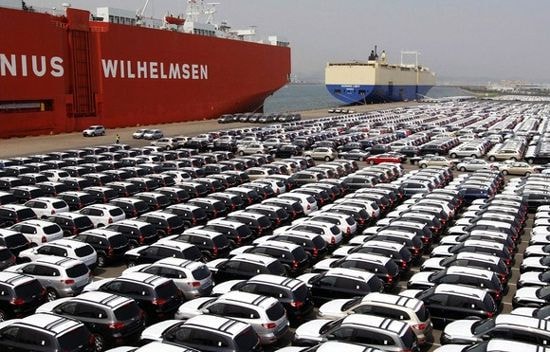Don't rush to buy a car, Korean cars are about to have a price reduction.
Tax on auto parts imported from Korea to Vietnam will be reduced to 0-5%, according to the Free Trade Agreement that the two countries have just signed. Thanks to that, the prices of many Korean car models will decrease in the coming time.
After 8 rounds of negotiations, the Vietnam - Korea Free Trade Agreement (VKFTA) was officially signed on May 5. Seoul and Hanoi agreed to open their markets at 94.6% and 92.2% for each other based on the import turnover of 2012. Among them, there are many key agricultural and aquatic export groups such as shrimp, crab, fish, tropical fruits and industrial products such as textiles, wooden furniture, mechanical products...
On the Vietnamese side, some items will have their taxes cut, mainly in industrial goods such as textile and garment materials, plastic materials, electronic components, trucks and cars with an engine capacity of 3,000 cc or more, auto parts, and household appliances.
Auto companies said that although small engine car models are not subject to tax reduction, the tax on imported auto parts from Korea has been reduced, so car models assembled in Vietnam will have lower prices.
 |
| The number of cars imported from Korea in 2014 was 6,050 units, an increase of nearly 63%. |
Currently, the import tax on auto parts from Korea to Vietnam is at an average rate of 14-20%. This tax rate, according to the reduction roadmap, will be 0-5%, helping to save more on production costs. Thanks to that, Vietnamese people can hope that the price of Korean cars will decrease significantly, increasing the competitiveness with cars imported from ASEAN.
Without needing to reduce taxes, Korean cars have long been at the top of the list of markets that Vietnam imports the most from. Statistics from the General Department of Customs show that in the first quarter of 2015, the number of imported cars from Korea was at the top with 6,050 out of a total of 25,200, an increase of nearly 63%. Not to mention the number of nearly 5,000 Hyundai i10 cars of the Korean brand but manufactured in India, exported to Vietnam.
Korean cars are popular among Vietnamese people because of their modern, youthful exterior design, integrated with many trendy features but have very competitive prices compared to Japanese and American cars, etc. In consumer terms, it is "pay less, use more". Vietnam is currently the largest Korean car market in Southeast Asia.
In Vietnam, there are many Korean car models of Hyundai and Kia brands that are selling well. For example, the Hyundai i10 model, although imported completely from India with an import tax rate of nearly 70%, sold 14,000 units in 2014 and was the best-selling car model last year.
 |
| A series of other Korean car models assembled in Vietnam such as Kia Morning, Kia New Sorento, Hyundai Santa Fe,... will also have their prices reduced. |
Next is Kia Morning, which also sold quite well with nearly 10,000 units. This car is assembled in Vietnam with 7 versions and manual transmission, using a 1.0L engine, priced at 324 million VND, the cheapest car model in Vietnam.
Calculations show that when the import tax rate on components is reduced to 0-5%, the price of Korean cars can be reduced by about 7%. Thanks to that, a series of other Korean car models assembled in Vietnam such as Kia Morning, Kia New Sorento, Hyundai Santa Fe,... will also benefit, with prices reduced.
Some sources say that in the near future, the Hyundai i10 model may also be assembled in Vietnam. With the reduction of import tax on components, the price of this model will also be cheaper than when imported completely from India.
In addition, Korean trucks also have more opportunities to penetrate the Vietnamese market. In addition to imported components for assembly, complete trucks also have reduced taxes.
Korean trucks are considered to be of good quality, but their high prices are not suitable. Vietnamese customers still prefer to use Chinese trucks because the selling price is only 2/3 compared to Korean trucks, and they depreciate quickly. However, Chinese trucks are of low quality, many of which do not meet the prescribed standards, are dangerous, so they are being tightened. The types of Korean trucks that have reduced taxes are those with a load capacity of 15 tons or more. If the price is reduced, they will certainly compete strongly with Chinese trucks.
According to VietNamnet






